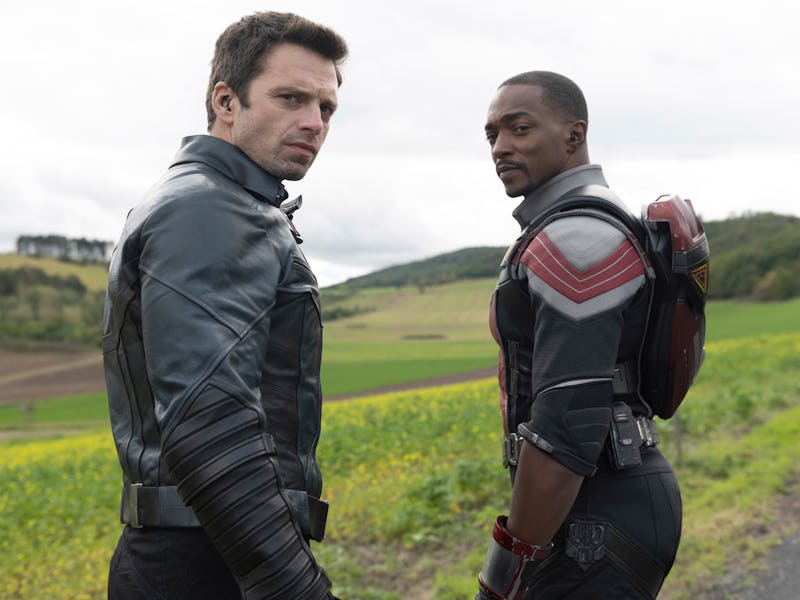Falcon and Winter Soldier and WandaVision reveal Marvel's big new problem
The two series suffer from the same issues.

And just like that, Marvel’s first two Disney+ series have come to an end. The Falcon and the Winter Soldier wrapped up its six-episode run today, just a little over a month after WandaVision aired its own divisive finale. After taking a moment to step back and look at them as a whole too, it’s pretty clear to see that the two shows’ strengths and weaknesses are ultimately the same.
WandaVision and Falcon and the Winter Soldier’s shared strengths and flaws aren’t just particular to these two shows though. They’re the same ones that have always been present in the Marvel Cinematic Universe. It’s just that, in these Disney+ series that seem to stretch a movie plot over six or nine episodes, those strengths and weaknesses are amplified.
👉 Read more at our Falcon and the Winter Soldier hub.
What Marvel’s Disney+ shows get right
Sebastian Stan and Anthony Mackie in The Falcon and the Winter Soldier.
Marvel Studios has always been exceptionally good at casting — beginning with Robert Downey Jr. as Tony Stark all the way back in 2006. But nowhere is the studio’s eye for picking out onscreen talent more visible than it is in its Disney+ series. Why? Because it shows just how well the studio is at casting even the minor characters in its films.
That was the case with WandaVision, which allowed Paul Bettany and Elizabeth Olsen to shine in a way that no Marvel project previously had, so much so in fact that some critics and fans expect both actors to pick up some awards for their performances at awards shows later this year. (Olsen’s performance in WandaVision’s eighth episode is nothing short of astonishing.)
The case is the same for The Falcon and the Winter Soldier — a series that gives both actors the chance to prove their worth as legitimate leading men within the MCU. Mackie’s work in The Falcon and the Winter Soldier’s premiere might still be the single best performance he’s given as Sam Wilson to date, and Stan’s near-wordless performance in the opening sequence of Falcon’s fourth episode stands tall as one of the series’ biggest highlights.
However, where WandaVision and The Falcon and the Winter Soldier work as showcases for the talent of their actors, they also shine a spotlight on some of Marvel’s worst storytelling habits.
Marvel’s big new problem
Elizabeth Olsen in WandaVision.
Neither WandaVision nor The Falcon and the Winter Soldier totally work as complete seasons of television. Both shows have some pretty major plotting and pacing issues, and both end with finales that focus heavily on unnecessary, drawn-out action and visual effects sequences.
That’s not a problem specific to these two shows either. Marvel (and comic book films in general) has always relied too heavily on characters punching each other across CGI landscapes — it’s just more noticeable here because the Disney+ shows don’t quite have the budget to deliver what they’re attempting to pull off.
Of course, that also isn’t to say that there aren’t parts of WandaVision and The Falcon and the Winter Soldier’s stories that land with real emotional weight.
In WandaVision, Wanda’s attempts to reckon with and tackle her grief by translating it into versions of the pop culture she consumed as a child is a legitimately moving and emotionally potent journey. The problem is, it’s also surrounded by some pretty major narrative issues, like a villain who never poses much of a threat (and who’s only revealed seven episodes into a nine-episode season for no apparent reason), wonky superhero fights, and one-note characters like S.W.O.R.D director Tyler Hayward.
The Flag-Smashers
The Falcon and the Winter Soldier, meanwhile, only managed to really deliver on part of its story. Sam’s journey towards accepting the Captain America mantle and shield proved to be the highlight of the show, and the way the series used characters like Isaiah Bradley (Carl Lumbly) and John Walker (Wyatt Russell) to fill out its discussions of systemic racism and nationalism only made it that much more compelling.
Falcon’s attempts to tackle radicalism, activism, and nationalism in the form of characters like The Power Broker/Sharon Carter and the Flag-Smashers were notably less successful or compelling. That’s a pretty big problem considering Sharon and the Flag-Smashers function as the primary focuses of its finale episode (even Bucky’s confession to Nakajima felt like it was cut down for time).
The future of Marvel television
Carl Lumbly as Isaiah Bradley in The Falcon and the Winter Soldier.
WandaVision and The Falcon and the Winter Soldier have been immense successes for Marvel in terms of public exposure and popularity. But narratively, the shows suffer from the same issues that have plagued the MCU for years now.
Moving forward, the studio’s Disney+ outings could just do with a little more focus on the core emotional throughlines of their stories and less on filling them with unnecessary supervillains and CGI action setpieces. In the end, those elements only detract from the parts of Marvel’s projects that always work the best — their characters.
The Falcon and the Winter Soldier is streaming now on Disney+.
This article was originally published on